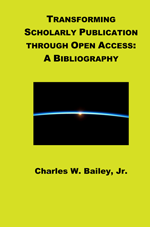Christian Gumpenberger, María-Antonia Ovalle-Perandones, and Juan Gorraiz have self-archived "On the Impact of Gold Open Access Journals" in U: Scholar.
Here's an excerpt:
This study identified the current set of Gold Open Access journals featuring a Journal Impact Factor (JIF) by means of Ulrichsweb, Directory of Open Access Journals and Journal Citation Reports (JCR). The results were analyzed regarding disciplines, countries, quartiles of the JIF distribution in JCR and publishers. Furthermore the temporal impact evolution was studied for a Top 50 titles list (according to JIF) by means of Journal Impact Factor, SJR and SNIP in the time interval 2000-2010. The identified top Gold Open Access journals proved to be well-established and their impact is generally increasing for all the analyzed indicators. The majority of JCR-indexed OA journals can be assigned to Life Sciences and Medicine. The success-rate for JCR inclusion differs from country to country and is often inversely proportional to the number of national OA journal titles.
| Digital Scholarship | Transforming Scholarly Publishing through Open Access: A Bibliography |


